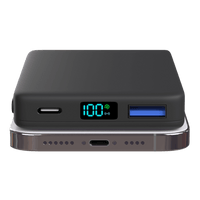
Power Bank Battery

Nothing is more annoying and frustrating than a dead phone. You must find a charger, hope there's an outlet available, and wait for your device to charge.
But what if you can avoid all that by carrying a power bank with you? These little devices can be a lifesaver, and we'll show you how to use them in this post. Keep reading to learn more!
A power bank is like a rechargeable portable battery that you can carry around. They are designed to help you recharge your devices on the go when you don’t have access to a mains power supply or your regular wall charger. Power banks come in various sizes, from sleek and compact to larger high-capacity units.
But even the super powerful ones are still sophisticated and portable. So, if you want an efficient way to keep your devices charged while you’re on the move, a power bank could be just what you need.
Furthermore, you can use power banks to charge any device that operates with a battery. This may include mobile phones, tablets, gadgets and tech, cameras, consoles, headphones, and even some laptops.
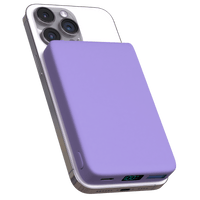
If you've just bought a power bank, you might be wondering how to use it for the first time. Here's our comprehensive guide to getting you started.
It is always important to read the user manual before using the product when it comes to electric devices. While power banks are relatively simple to use, there are still some essential instructions that you should follow for a safe and proper operation.
For example, most power banks need to be charged before first use, and it is vital to know how long the charging process will take. Additionally, it is crucial to be aware of the different light indications on the power bank, as they provide information about the current charge level.
By reading the user manual, you can be sure that you are using your power bank safely and effectively.
Apart from not all power banks are the same. Various brands offer different functions with their power bank. Thus it is strongly recommended to read the product manual before using them.
It is always exciting to get a new gadget, especially one that is as useful as a power bank. After unboxing your new toy, the first thing you want to do is charge it up so you can start using it. However, before you can use your power bank to charge your phone, you need to charge the power bank itself. Here's how to do that:
If your power bank does not have a USB cord and wall adapter. Then you need to charge it via your smartphone charger before using it, and it is simple.
Just plug the USB cord’s larger end into the wall adapter and the smaller one in your power bank. Let it charge completely.
Another vital point is that charging time is not the same for all power banks. It mainly depends on their make, model, and capacity. The general rule here is that power banks with higher capacity take longer to charge than those with low capacity. To know about your power bank’s actual charging time, see the product manual, and you will find all the details.
While a power bank can give your phone the boost it needs to get through the day, it's essential to be careful not to overcharge it. Power banks are designed to be used intermittently, and charging them overnight can strain the battery unnecessarily.
Besides, overcharging can shorten the lifespan of your power bank and make it more likely to malfunction.
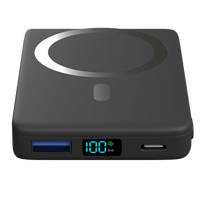
After ensuring that your power bank is charged fully, now is the time to charge the device using your power bank. Doing so is simple, connect your device with your power bank via a USB cord and let it charge.
Furthermore, all our devices have at least one USB port, but some have multiple ports for discharging electricity.
When your power bank is running low on juice, it can be tempting to plug it in and forget about it. However, keeping an eye on the charging process is essential to ensure that your power bank doesn't overheat or become damaged.
Likewise, it's crucial to know when the power bank is fully charged so that you can unplug it before the battery starts to drain.
By paying attention to these details, you can extend the lifespan of your power bank.
Most power banks will have an indicator light that changes color or turns off when the battery is full. However, you must remember a few crucial things. First, check your power bank's owner manual for specific instructions. And second, remember that the estimated charging time prescribed by your power bank brand is just an estimate. So don't worry if it takes a bit longer (or shorter) for your power bank to reach full capacity.
As mentioned above, most power banks have indicators. These small lights can tell you how much charge is left in your power bank. Most power banks have four indicators which represent four charge settings:
• 1 light means your bank has a 25% charge left.
• 2 lights mean your power bank has a 50% charge left.
• 3 lights mean your power bank has a 75% charge left.
• 4 lights mean your power bank has 95% charge left.
Another thing to remember is that almost all power banks will not give a 100% charge due to safety reasons. This is to protect your bank from overcharging.
Lastly, after identifying how much charge is left in your power bank, don’t wait for the complete discharge of your power bank. This is because complete discharge means the battery will suck more energy and affect its life.
This was our simple but comprehensive guide on how to use a power bank. Hopefully, this has been helpful, and you are now confident in your ability to charge up your devices while on the go.
Remember, when selecting a power bank, it’s important to consider the size of the unit and its capacity in relation to the devices you plan to charge. And as always, happy charging!
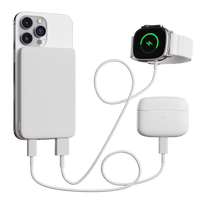
Explore More: Our Other Blog Posts Await
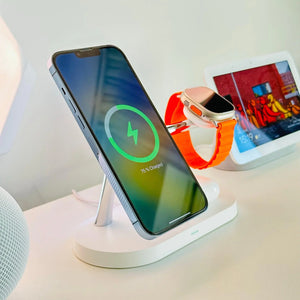
Wireless charging has become a popular technology for mobile devices, but many people still have misconceptions about how it works and if it's safe. In this blog post, we dispel common myths about .
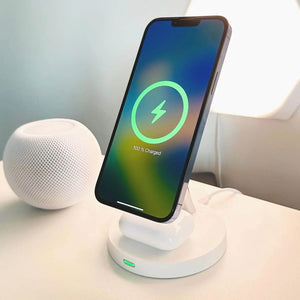
Wireless charging has become an increasingly popular way to charge devices, with numerous brands and options available in the market. However, choosing the right wireless charger can be a daunting .
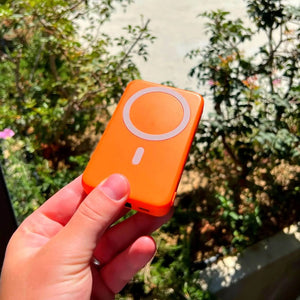
Nothing is more annoying and frustrating than a dead phone. You must find a charger, hope there's an outlet available, and wait for your device to charge. But what if you can avoid all that by carr.